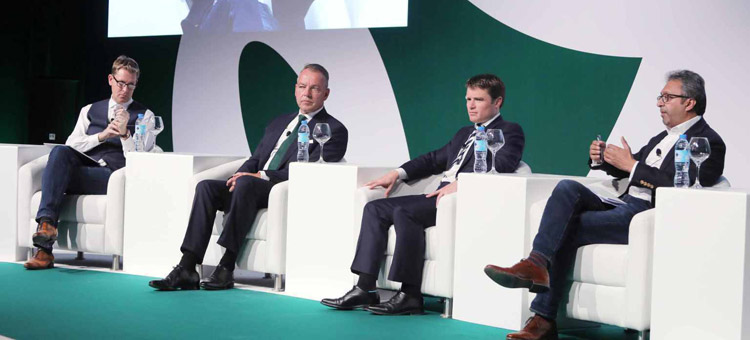Dubai: Innovative Hyperloop connections could reduce travel time between Dubai International Airport (DXB) and Al Maktoum International Airport (DWC) by around 34 minutes at some stage in the future, according to expert panelists at Arabian Travel Market’s Global Stage.
Providing a lightening-speed Hyperloop transit system would allow airport passengers to travel between both airports in as little as six to seven minutes – a shorter transit time than travelling between terminals at Dubai International Airport. The future of Hyperloop and travel infrastructure in the UAE and wider GCC was discussed at Arabian Travel Market (ATM 2018), taking place at Dubai World Trade Centre, during a seminar session titled ‘Future Travel Experiences’.
Moderating the session, Richard Dean, a UAE-based business broadcaster and presenter, was joined by a host of high-profile panelists including Christoph Mueller, Chief Digital and Innovation Officer, Emirates Airline; Harj Dhaliwal, Managing Director Middle East and India Operations, Virgin Hyperloop One; and Michael Ibbitson, Executive Vice President (Infrastructure and Technology), Dubai Airports.
“Looking to the future, having both Dubai International Airport and Al Maktoum International Airport (DWC) as key stations on the hyperloop system is essential. At present, Emirates only operates from Dubai International Airport but the implementation of a hyperloop system between both airports could allow the airline to effectively and efficiently work from both hubs,” said Michael Ibbitson, Executive Vice President (Infrastructure and Technology Dubai Airports).
Virgin Hyperloop One, a futuristic transportation concept through which pods, propelled by magnets and solar, which will move passengers and cargo at speeds of 1,200 kph, is the most prominent tourism infrastructure development in the UAE at present. Backed by Dubai-based DP World, Hyperloop One has the potential to transport approximately 3,400 people an hour, 128,000 people a day and 24 million people a year.
In November 2016, Dubai’s Road and Transport Authority (RTA) announced plans to evaluate a hyperloop connection between Dubai and Abu Dhabi, which could reduce travel times between the two emirates by 78 minutes.
Harj Dhaliwal, Managing Director Middle East and India Field Operations, Virgin Hyperloop One, said, “Providing a hyperloop connection that allows both UAE residents and tourists to travel between Dubai and Abu Dhabi in just 12 minutes is just the beginning. In the future, other emirates and indeed other GCC countries could also be linked, with journeys between Dubai and Fujairah as low as 10 minutes and Dubai to Riyadh in 40 minutes.”
Hyperloop One isn’t the only concept to boost tourism infrastructure in the region, the development of key international airports in Saudi Arabia and airport expansion in the UAE, Bahrain, Oman and Kuwait as well as cruise terminal expansions, improved domestic inter-city road and rail work and the growth of low-cost airlines will keep the GCC at the forefront of tourism infrastructure and innovation.
GCC capital investments in tourism infrastructure are expected to reach $56 billion by 2022, with the UAE ranked the most competitive in the region, driven by the development of multiple revolutionary transport projects, according to Arabian Travel Market’s research partner, Colliers International.
Air passenger arrivals to the GCC are forecast to increase at a compound annual growth rate (CAGR) of 6.3 per cent, from 41 million in 2017 to 55 million in 2022. The development of new airports across the GCC region combined with the introduction of various low-cost carriers such as flydubai and recently launched Saudi low-cost airline Flyadeal are expected to contribute heavily to this growth.
In Dubai, cruise tourism is expected to grow over the next two years as the Emirate targets the arrival of 20 million tourists a year, ahead of Expo 2020. During the 2016-2017 season, Dubai welcomed 6,50,000 cruise tourists with this figure forecast to increase to one million by 2020. Expansion works at DP World’s Hamdan bin Mohammed Cruise Terminal at Mina Rashid are expected to contribute to this growth. Set to be the largest terminal in the world, the facility is capable of handling 18,000 travellers every single day.
For more information on Arabian Travel Market 2018, please visit the website at www.arabiantravelmarket.wtm.com





